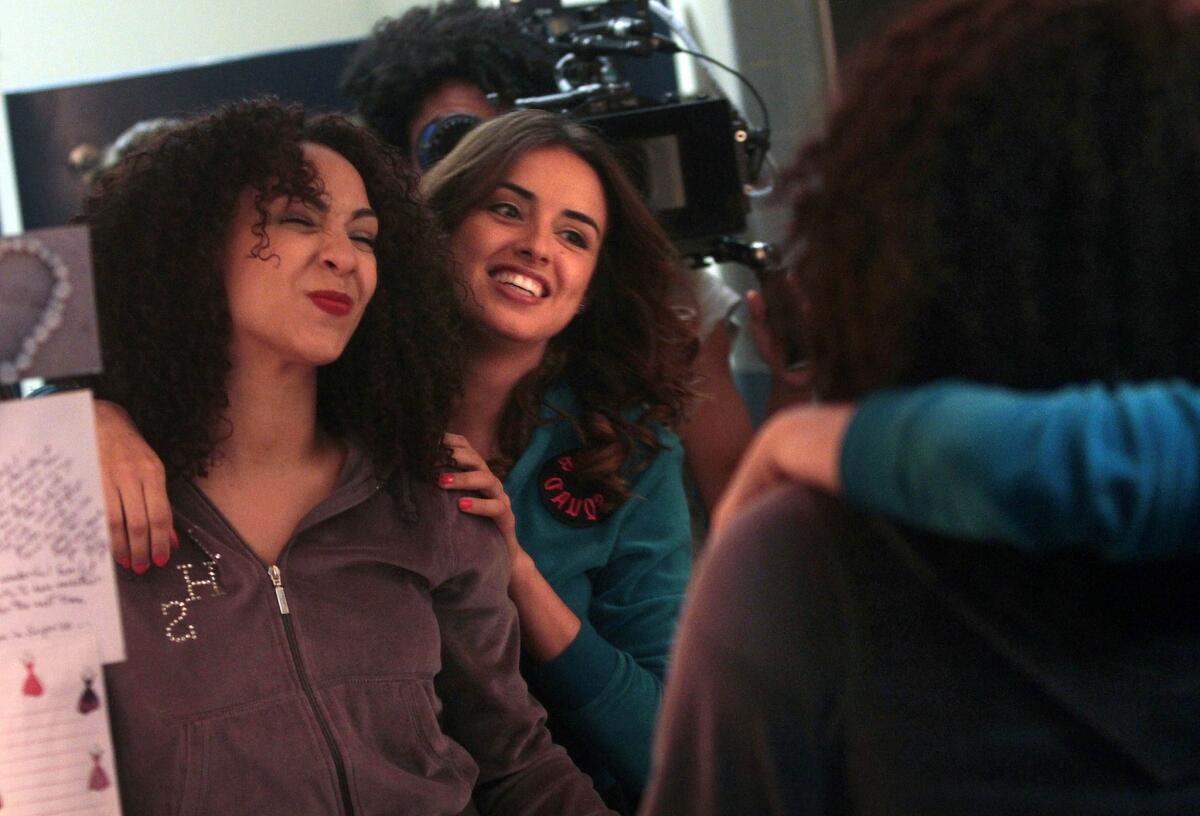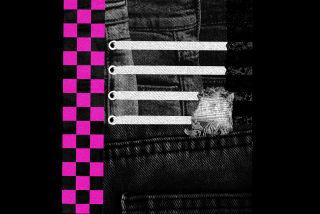‘East Los High’: A teen soap opera that’s a teaching tool

Inside a cramped writers room in a Hollywood office building, a team of overage teenagers was debating how a Los Angeles high schooler might carry on a conversation with a counselor about being the victim of domestic violence.
“I’m not sure the character’s reaction would be hesitation so much as defensiveness,” one said.
“Yeah, I think she’d be, like, ‘You don’t understand! I’m his girlfriend! I want to make him happy!” another chimed in.
This is how Hulu’s popular teen soap “East Los High” gets made. In these quarters, telenovela meets after-school special, spawning story lines that had laptop and cellphone screens fogged up in its first season last summer, all the while trying to relay a social message.
The series consistently ranked among the ad-supported streaming site’s most popular programs, demonstrating that an English-language show with an all-Latino cast — a TV unicorn in the broadcast marketplace — can find a following. Times TV critic Robert Lloyd singled it out as one of the top summer shows to watch last year, saying it was not only “as eventful as any other teen soap” but noted that it “feels down-to-earth and issue-oriented.”
Hulu hopes the clicks and taps won’t slow when it launches the second season on July 9.
“It is the type of show that works really well on a digital platform like ours,” said Rodrigo Mazon, director of content acquisition at Hulu. “It’s addictive, and Season 2 is even more so.”
In the teen drama academy where “Pretty Little Liars” and “The Vampire Diaries” rule the halls with episodes indulging in cheating, sex, secrets and violence, “East Los High” tackles the same narrative pushers for educational purposes.
The half-hour series was developed as a response to the high rate of teen pregnancy among Latinas in the U.S. by Population Media Center, a Vermont-based nonprofit that creates content to promote social change. Carlos Portugal, whose credits include Tyler Perry’s “Meet the Browns,” was enlisted to create the series, which he did with the help of producer Kathleen Bedoya.
“We know we’re a small show,” Portugal said. “And that’s OK. I just felt that when I watched TV, I wasn’t seeing myself, or my sisters or my nieces being represented. There’s a void that we’re just trying to help fill.”
“East Los High” makes use of soap opera elements to deliver a social message — similar to the Sabido Method, a way of mixing entertainment and education developed in Mexico in the ‘70s by Miguel Sabido and adopted by certain Mexican telenovelas including “Vamos Juntos” (“We Go Together”) and “Los Hijos de Nadie” (“Nobody’s Children”), which both aired on Televisa.
Hulu licensed the finished 24-episode first season and made it available on HuluPlus, which requires a membership, as well as Hulu and HuluLatino, the latter of which consists primarily of Spanish-language content.
The streaming service quickly discovered that casting a wider net for young Latinos interested in bicultural programming in English was beneficial, with the series ranking as one of Hulu’s top 10 shows in its premiere month. Not an especially surprising outcome when you consider the market for it: U.S.-born Latinos account for more than 60% of Latinos in the country, according to recent census data.
“We wanted to create a place where kids could learn about sex ed and the countless other issues teens face these days,” said the online series’ executive producer Katie Elmore Mota. “But you can’t talk down to them and you can’t make them fall asleep.”
Some of the issues dealt with in the show’s first season included losing one’s virginity, promiscuity and unplanned pregnancies. On the show’s Hulu page, viewers can find a comprehensive list of links with more information on the topics discussed during an episode.
It heads into its second season now as a Hulu Original — allowing for a slightly bigger budget. The 12-episode sophomore outing shifts its focus on a new cast of students at East Los High, introducing Vannessa Vasquez as incumbent bad girl Camila, along with her posse of friends, while still keeping its eye on some returning characters.
“The wholesome kid show, the polished teen drama isn’t real life,” said Danielle Vega, who returns as reformed bad girl Ceci — one of several familiar faces. “‘East Los High’ is gritty, it’s in your face because the world out there is in your face. But it’s also teaching something, which is incredibly important because you look at kids these days and they don’t look up from their screens. So at least this show gives them something to think about when their eyes are glued to their devices.”
Themes woven into the series this season include bisexuality and domestic violence, the latter of which was being explored during a writers room session in January.
The scene involved one female character’s visit to a counselor with whom the teen’s physically abusive relationship with her boyfriend is discussed.
The writers debated cutting some dialogue for the sake of brevity, but a note from the powers that be ruled that certain phrasing needed to be kept to be in line with how a professional might approach the situation. More than 15 public health organizations — including the National Domestic Violence Hotline, Advocates for Youth and Planned Parenthood — advise on the scripts and offer suggestions on what works and doesn’t work in getting the educational points across.
“I like that my culture is a reference I can access and draw from,” said writer Charo Toledo. “But it’s a real challenge — kids these days are constantly faced with adult situations. And yet they still express themselves as kids — and you have to keep that in mind so that when they watch the show, they don’t feel like they’re in a classroom.”
The eight writers for the forthcoming season said they made a concerted bid not to overdo the preaching.
“The first season, we were a little more educational,” Portugal said. “The kids would go to counselors and clinics. Kids don’t always care what adults have to say. They go to their peers. So we’re having them talk to each other more about some of the issues they’re going through when it makes more sense.”
Determining when that applies and crafting the sabroso story lines is a writers room where the minority are the majority. It’s composed solely of Latino writers, with the exception of one African American woman. Not to mention, the bulk of the scribes are women, with just two men.
The world they’ve crafted doesn’t deny Latinos can be dropouts or teen moms, but they’ve broadened the scope so that Latinos are also doctors, counselors and activists.
“Since we are the culture, it never feels like, ‘Oh, we’re creating stereotypes,’” Portugal said. “Stereotypes exist. I think one of the reasons why we are doing this is we present them, and then we start exploring them. My hope is that the people from East L.A. see themselves being portrayed as diverse individuals.”
“East Los High” is all shot on location — a good portion is filmed in Boyle Heights, with Norwalk and Lincoln Heights also providing backdrops. So if the places feel authentic, it’s probably because they are. In the first season, for example, the house belonging to a producer’s tia (aunt) was used as-is.
“The production designer was, like, ‘What should I do?’ and I’m, like, ‘Don’t do anything! Just go home,’” Portugal recalled. “I don’t want a production designer coming in putting in baskets and Frida Kahlo paintings. It was already perfect — and it was what we wanted to capture: ourselves. How we live. This show is just trying to do a small part in showing that.”
More to Read
The complete guide to home viewing
Get Screen Gab for everything about the TV shows and streaming movies everyone’s talking about.
You may occasionally receive promotional content from the Los Angeles Times.







